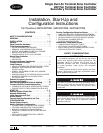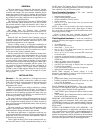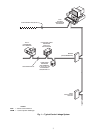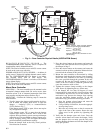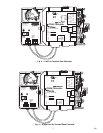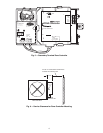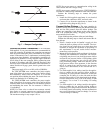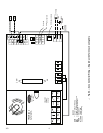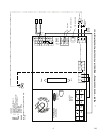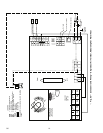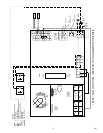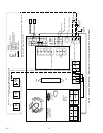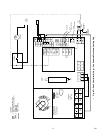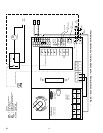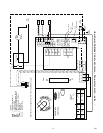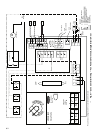2
GENERAL
The zone controller is a single duct, fan powered, Variable
Air Volume (VAV) terminal control with a factory-integrated
controller and actuator. The zone controller maintains precise
temperature control in the space by operating the terminal fan
and regulating the flow of conditioned air into the space. Build-
ings with diverse loading conditions can be supported by con-
trolling reheat or supplemental heat.
The VAV Fan Terminal Zone Controller (33ZCFANTRM)
provides dedicated control functions for series fan or parallel
fan powered terminals, single duct terminals with 3 stages of
heat, or as a primary controller for dual duct or zone pressure
control applications.
The Single Duct Air Terminal Zone Controller
(33ZCVAVTRM) provides dedicated control functions for sin-
gle duct terminals with modulating heat or up to 2 stages of
heat.
When the VAV Fan Terminal Zone Controller is used in
conjunction with a secondary terminal and the 33ZCSECTRM
secondary terminal zone controller, either dual duct or zone
pressurization applications can be supported.
Carrier’s Linkage system is an integrated combination of
Carrier Comfort Network (CCN) controllers for use with Sin-
gle Duct air terminals and VAV Fan Powered terminals. The
Single Duct air terminal and VAV Fan terminal zone control-
lers are part of the Carrier ComfortID system.
Devices manufactured by Carrier which have Product Inte-
grated Controls on the same communication bus as the zone
controller, air handlers (such as the 39L,T), or large rooftop
units do not require an external controller to function as part of
a Carrier linkage system. These air handlers or large rooftop
units feature factory-installed Product Integrated Control (PIC)
controllers that are directly compatible with the system. Con-
sult your local Carrier representative for the complete list of
compatible air handlers. The Comfort System AirManager
(CSAM) or the CC6400 supports linkage for non-Carrier de-
vices or air handlers. Figure 1 shows an example of a Carrier
linkage system.
INSTALLATION
General —
The zone controller is a microprocessor-based
direct digital control (DDC) controller for variable air volume
(VAV) air terminals. It can be retrofitted on units manufactured
by Carrier or other manufacturers to provide pressure-
independent VAV control.
Each zone controller has the ability to function as a linkage
coordinator for systems with up to 128 zones. As a linkage co-
ordinator, a zone controller will retrieve and provide system in-
formation to the air handling equipment and other zone con-
trollers. A zone controller can function as a stand alone device
by installing a primary supply air sensor.
The zone controller monitors differential pressure from an
airflow pickup (or a pair of pickups) mounted on the terminal
box. It compares the resulting signal to an airflow set point in
order to provide pressure-independent control of the air passing
through the terminal.
The zone controller is connected to a wall-mounted, field-
supplied, space temperature sensor (SPT) in order to monitor
zone temperature changes and satisfy zone demand.
On stand-alone applications or applications with heat, the
zone controller must be connected to a field-supplied supply air
temperature (SAT) sensor to monitor the temperature of the air
delivered by the air terminal.
Carrier’s Network Service Tool can be connected to the sys-
tem at the SPT sensor if CCN communication wiring is run to
the SPT sensor. The Network Service Tool can be used to ad-
just set points, set operating parameters, and fully configure the
zone controller or any device on the system.
Zone Controller Hardware —
The zone controller
consists of the following hardware:
• terminal control module
• torque-limiting damper actuator
• airflow transducer (velocity sensor)
• plastic enclosure
• one no. 8 x
1
/
2
-in. sheet metal screw (to prevent zone
controller rotation)
NOTE: A filter is not provided for the airflow transducer.
For installations on systems with a high degree of impuri-
ties, an air filter can be purchased and installed on the trans-
ducer high pressure pickup.
Figure 2 shows the zone controller physical details.
Figures 3-5 show the 3 different types of zone controllers.
Field-Supplied Hardware —
Each zone controller re-
quires the following field-supplied components to complete its
installation:
• air terminal unit
• space temperature sensor
• transformer — 24 vac, 40 va
• two no. 10 x
1
/
2
-in. sheet metal screws (to secure SAT
sensor to duct, if required)
• two no. 6-32 x
5
/
8
-in. screws (to mount SPT sensor base
to electrical box)
• contactors (if required for fan or electric heat)
• supply air temperature sensor (required for terminal with
ducted heat)
• indoor air quality sensor (if required)
• relative humidity sensor (if required)
• one SPST (for each stage of electric heat, not required
for Carrier fan terminals)
• valve and actuator for hot water heat (if required)
• delta pressure airflow pickup
NOTE: When selecting an airflow pickup, it is the
designer's responsibility to select a sensor that provides the
desired output at the design airflow.
•wire
• polyethylene tubing (for pressure pickup)
• bushings (required when mounting SAT sensor in a duct
6-in. or less in diameter)
• primary air temperature sensor (if required)
SPACE TEMPERATURE SENSOR — Each zone control-
ler requires a field-supplied Carrier space temperature sensor.
There are two sensors available for this application:
• 33ZCT55SPT, Space Temperature Sensor with Override
Button
• 33ZCT56SPT, Space Temperature Sensor with Override
Button and Set Point Adjustment
PRIMARY AIR TEMPERATURE SENSOR — A field-
supplied, primary air temperature (PAT) sensor (part number
33ZCSENPAT) is used on a zone controller which is function-
ing as a Linkage Coordinator for a non CCN/Linkage compati-
ble air source.
SUPPLY AIR TEMPERATURE (SAT) SENSOR — On
stand-alone applications or applications with ducted heat, the
zone controller must be connected to a field-supplied supply air
temperature (SAT) sensor (part number 33ZCSENSAT) to
monitor the temperature of the air delivered by the air terminal.
The zone controller will maintain the air temperature below the
maximum air temperature in ducted heating applications.



